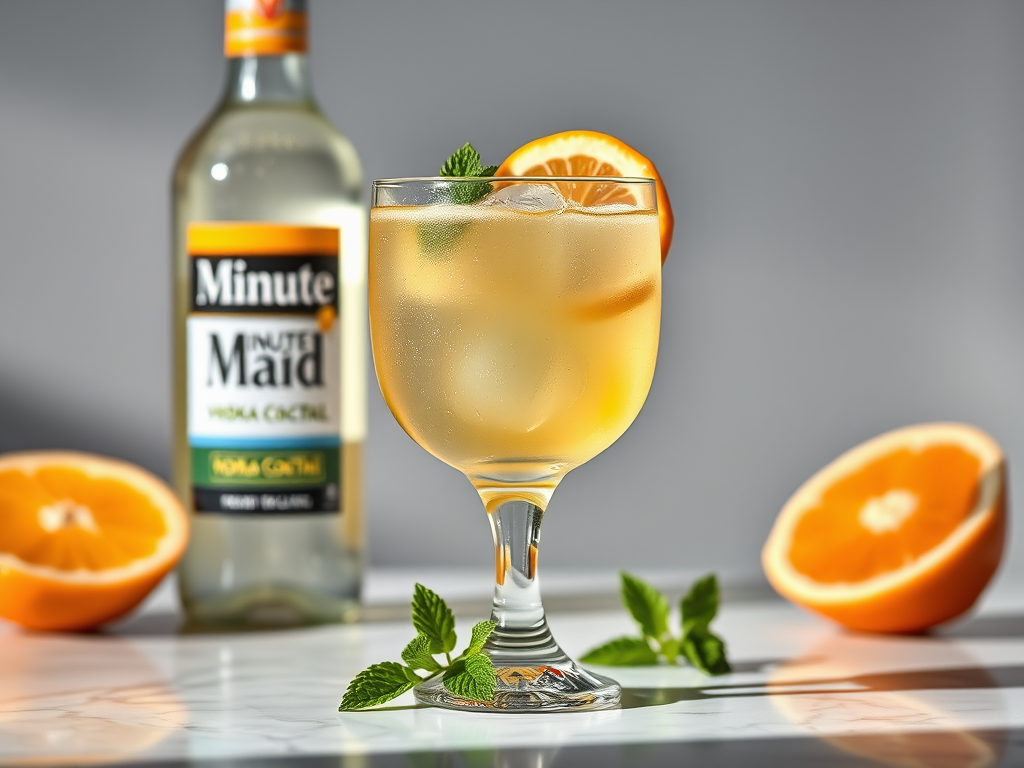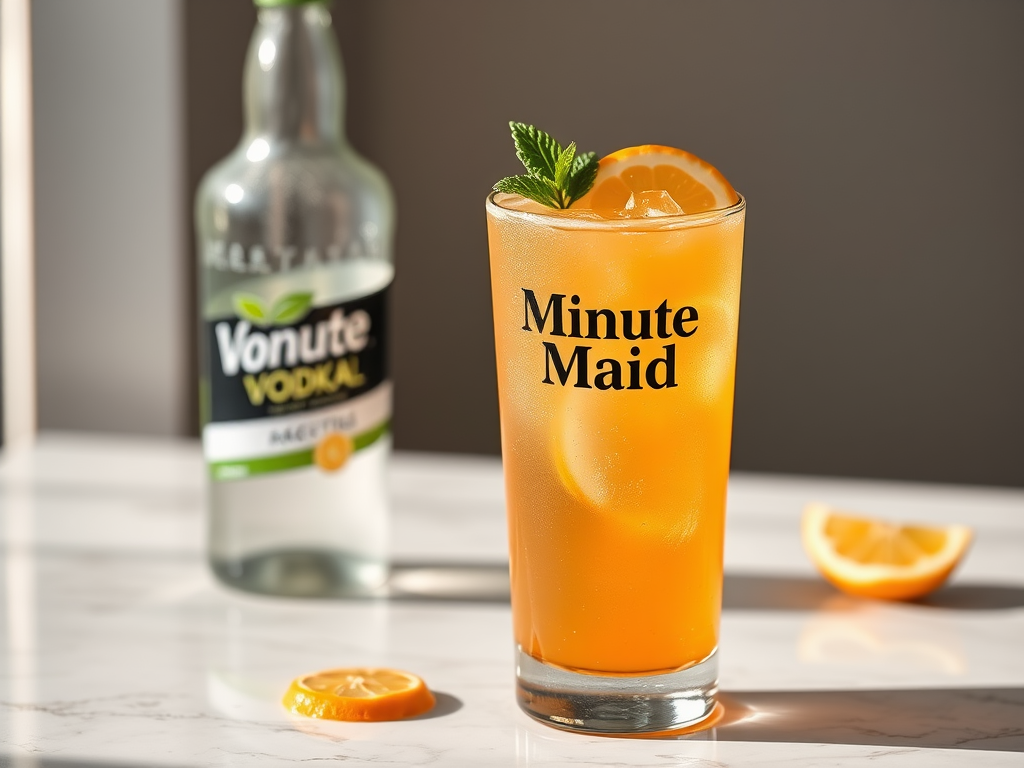Coca-Cola has officially entered the spirits-based ready-to-drink market with its latest launch of Minute Maid vodka cocktails, expanding its alcoholic beverage portfolio through its Red Tree Beverages subsidiary. The new lineup features vodka-based lemonade and pink lemonade varieties alongside Minute Maid Spiked Vodka Punch in citrus, berry, and tropical punch flavors, all with 5% ABV. These non-carbonated drinks, scheduled to hit shelves in Spring 2025, represent Coca-Cola’s strategic move to capitalize on the growing market for premium canned cocktails. As the beverage giant continues to diversify beyond its traditional soft drink offerings, this latest addition signals its commitment to meeting evolving consumer preferences for convenient, spirits-based refreshments.
From Fruit Juice to Vodka Mixer: Minute Maid’s Evolution
The iconic Minute Maid brand has come a long way from its origins as America’s favorite fruit juice. This strategic expansion into vodka-based cocktails follows the successful 2024 launch of wine-based Minute Maid Spiked, which featured popular flavors like Strawberry Daiquiri and Blue Hawaiian. The transition from wine to vodka base reflects market research showing consumer preference for spirits-based ready-to-drink (RTD) options.
What makes this launch particularly noteworthy is how it builds on Coca-Cola’s existing alcohol portfolio. The company has been steadily increasing its presence in the alcohol market through various partnerships and brands. Alongside Minute Maid Spiked, Coca-Cola’s alcohol lineup now includes Topo Chico Hard Seltzer, Jack Daniel’s & Coca-Cola ready-to-drink cocktails, and Fresca Mixed.
The new Minute Maid vodka cocktails aim to provide a premium alternative to the Simply Spiked Lemonade line, which Coca-Cola produces in partnership with Molson Coors. By offering both wine-based and now vodka-based options, Minute Maid is positioning itself across multiple price points and alcohol preferences in the competitive RTD cocktail market.

Riding the RTD Cocktail Wave
Coca-Cola’s latest foray into alcoholic beverages responds directly to current market trends driving the RTD sector. Industry data shows a significant shift toward spirits-based cocktails, with consumers increasingly favoring these over malt-based or wine-based alternatives. This preference reflects a broader trend toward premium RTD options that more closely mimic the bar experience.
The non-carbonated juice refresher category has seen particularly impressive growth. According to market analytics, vodka-infused tea and lemonade products have been standout performers, with the Surfside brand recording a staggering 378% year-over-year sales growth in 2024. Such remarkable performance helped Surfside secure its position as the second best-selling canned cocktail made with spirits that year.
I’ve noticed more consumers seeking convenient yet high-quality alternatives to traditional mixed drinks. This aligns perfectly with my observations of the growing interest in seasonal cocktails that offer both flavor and convenience. The 5% ABV level of these new Minute Maid offerings strikes a balance – strong enough to provide the expected cocktail experience but moderate enough for casual enjoyment.
The variety of flavors in the new lineup also addresses consumer demand for options. Between the classic lemonade variants and the punch offerings in citrus, berry, and tropical profiles, Coca-Cola has created a range that can appeal to different taste preferences and drinking occasions.
The Competitive Landscape for Canned Cocktails
Coca-Cola isn’t alone in recognizing the potential of the spirits-based RTD market. Several major players have made similar strategic moves recently. Kraft Heinz entered the alcohol sector with Crystal Light vodka refresher in March 2025, leveraging its well-known low-calorie drink mix brand to tap into the ready-to-drink cocktail space.
Meanwhile, Molson Coors launched its Happy Thursday spiked refreshers in 2024, further crowding this rapidly expanding category. This competitive environment has pushed brands to differentiate through quality, flavor innovation, and marketing approaches tailored to specific consumer segments.
What separates Minute Maid’s offering is the combination of a trusted juice brand with premium spirits. Coca-Cola clearly recognizes that today’s consumers, particularly younger adults, are seeking higher quality ingredients in their RTD cocktails. The company’s existing distribution networks and brand recognition give it significant advantages as it expands in this space.
For cocktail enthusiasts interested in exploring beyond the mainstream offerings, there are also interesting developments in the craft spirits cocktail market. These products often feature more complex flavor profiles and premium ingredients, appealing to consumers looking for a more elevated drinking experience.
Consumer Preference Shifts Driving Product Innovation
The RTD cocktail market’s rapid expansion reflects broader changes in consumer behavior and preferences. Younger drinkers, particularly millennials and Gen Z, are showing a clear preference for convenience without sacrificing quality. These demographics have embraced the RTD format at higher rates than previous generations.
Another key factor driving innovation in this space is the preference for non-carbonated options. While hard seltzers dominated the RTD alcohol market in recent years, consumer interest has gradually shifted toward still beverages that deliver a smoother drinking experience. This trend partly explains why products like vodka-infused lemonades and teas have gained such momentum.
Health-conscious consumers are also influencing product development. Many newer RTD cocktails, including these Minute Maid offerings, highlight flavor profiles that feel fresher and less artificial. The juice-based formulations appeal to consumers looking for more natural ingredients in their alcoholic beverages.
The pandemic accelerated many of these trends, as home consumption of alcoholic beverages increased significantly. Even as on-premise dining and drinking have recovered, the convenience of premium RTD options has maintained strong appeal for consumers who discovered these products during lockdowns.
Marketing Strategies for the New Generation
Red Tree Beverages, Coca-Cola’s alcohol-focused subsidiary, has carefully crafted its approach to marketing these new products. According to their press release, “Red Tree Beverages brought these products to market through its relationships with authorized independent manufacturers.” This structure allows Coca-Cola to maintain appropriate separation between its core non-alcoholic business and its growing alcohol portfolio.
The target demographic for these products is clearly younger legal-age drinkers who prefer the convenience of canned cocktails but want something more sophisticated than the first generation of RTDs. Marketing efforts will likely emphasize the authentic flavor profiles and premium ingredients, positioning these products as elevated alternatives to making cocktails from scratch.
Social media will undoubtedly play a central role in promoting these new offerings. Brands in this space have found success with innovative marketing approaches that highlight lifestyle occasions and serving suggestions. The visual appeal of these beverages makes them natural fits for platforms like Instagram and TikTok.

Future Outlook for Coca-Cola’s Alcohol Strategy
This latest launch indicates Coca-Cola’s commitment to establishing a significant presence in the alcoholic beverage market. The company appears to be employing a portfolio approach, with different brands targeting different segments and price points within the broader RTD category.
Industry analysts expect Coca-Cola to continue expanding its alcohol offerings based on the success of these initial ventures. The ready-to-drink cocktail market still has considerable growth potential, particularly as beverage preferences evolve and legal restrictions on distribution ease in some markets.
Looking ahead, we might see further innovations in flavor profiles, alcohol bases, and packaging. The company could potentially explore higher-ABV offerings or more exotic flavor combinations if consumer reception to these initial products proves positive. Additionally, seasonal limited editions could become part of the strategy to maintain consumer interest.
For Coca-Cola, success in this space represents not just additional revenue streams but also a way to remain relevant to adult consumers who might otherwise drift away from the brand’s traditional soft drink offerings. By leveraging trusted names like Minute Maid in the alcohol space, the company can transfer decades of brand equity to new product categories.
As consumer interest in premium ready-to-drink cocktails continues to grow, this strategic expansion positions Coca-Cola to capture a significant share of this dynamic market segment. The company’s distribution power combined with its brand recognition creates a formidable entry into the spirits-based RTD category that competitors will need to watch closely.



